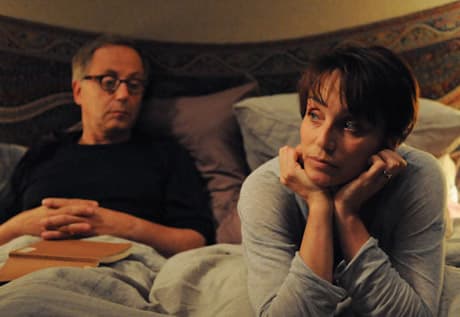Ever the genre provocateur, François Ozon's latest self-conscious work of comic academia tackles the nature of authorship as a form of manipulation or, as the title implies, a way into someone's house. He does this by examining the relationship between the reader and author while himself altering tone and style to reflect both the learning curves and misguided deviations of mysterious teenage protagonist writer Claude (Ernst Umhauer).
A high school student of limited financial means, Claude blends into the herd with the newly appointed uniform code, popping up unexpectedly as a satirical voice amidst a sea of lackadaisical tedium in the classroom of weathered and cynical French teacher Germain (Fabrice Luchini)
Seeing promise in a boy that took the humdrum assignment of "what did you do this weekend?" and made it into a dissection of middle-class values and ideals, in describing a visit to his more affluent friend's home, he tutors him and offers suggestions on improvement.
Claude's story about a present, encouraging father, Rapha (Denis Ménochet), and bored housewife mother, Esther (Emmanuelle Seigner), gradually changes from broad satire to realist deconstruction to twee melodrama as Germain offers new suggestions and tactics to his student about how to write.
But while this is happening, Germain's story with art curator wife Jeanne (Kristin Scott Thomas) makes similar tonal jumps, going from caricature, with an art gallery filled with penis swastikas and nude Hitler blow-up dolls, to sombre and introspective, with impressionist art displays.
Ozon constantly reminds us that the author is manipulating us just as Claude is manipulating Germain. The tone and style may change, but the template of winning over and taking over the life and/or will of the reader remains consistent, even when the narrative experiments with the nature of self-indulgent writing.
While this structure wears out its welcome somewhat by the third act, this self-aware, smartly rendered and ultimately voyeuristic look at writing as a tool for validation in relation to reading as perverse peephole titillation leaves a lot to think about.
What's more is that it's genuinely funny and entertaining while offering up its message, which is something more auteurs should work on.
(eOne)A high school student of limited financial means, Claude blends into the herd with the newly appointed uniform code, popping up unexpectedly as a satirical voice amidst a sea of lackadaisical tedium in the classroom of weathered and cynical French teacher Germain (Fabrice Luchini)
Seeing promise in a boy that took the humdrum assignment of "what did you do this weekend?" and made it into a dissection of middle-class values and ideals, in describing a visit to his more affluent friend's home, he tutors him and offers suggestions on improvement.
Claude's story about a present, encouraging father, Rapha (Denis Ménochet), and bored housewife mother, Esther (Emmanuelle Seigner), gradually changes from broad satire to realist deconstruction to twee melodrama as Germain offers new suggestions and tactics to his student about how to write.
But while this is happening, Germain's story with art curator wife Jeanne (Kristin Scott Thomas) makes similar tonal jumps, going from caricature, with an art gallery filled with penis swastikas and nude Hitler blow-up dolls, to sombre and introspective, with impressionist art displays.
Ozon constantly reminds us that the author is manipulating us just as Claude is manipulating Germain. The tone and style may change, but the template of winning over and taking over the life and/or will of the reader remains consistent, even when the narrative experiments with the nature of self-indulgent writing.
While this structure wears out its welcome somewhat by the third act, this self-aware, smartly rendered and ultimately voyeuristic look at writing as a tool for validation in relation to reading as perverse peephole titillation leaves a lot to think about.
What's more is that it's genuinely funny and entertaining while offering up its message, which is something more auteurs should work on.




